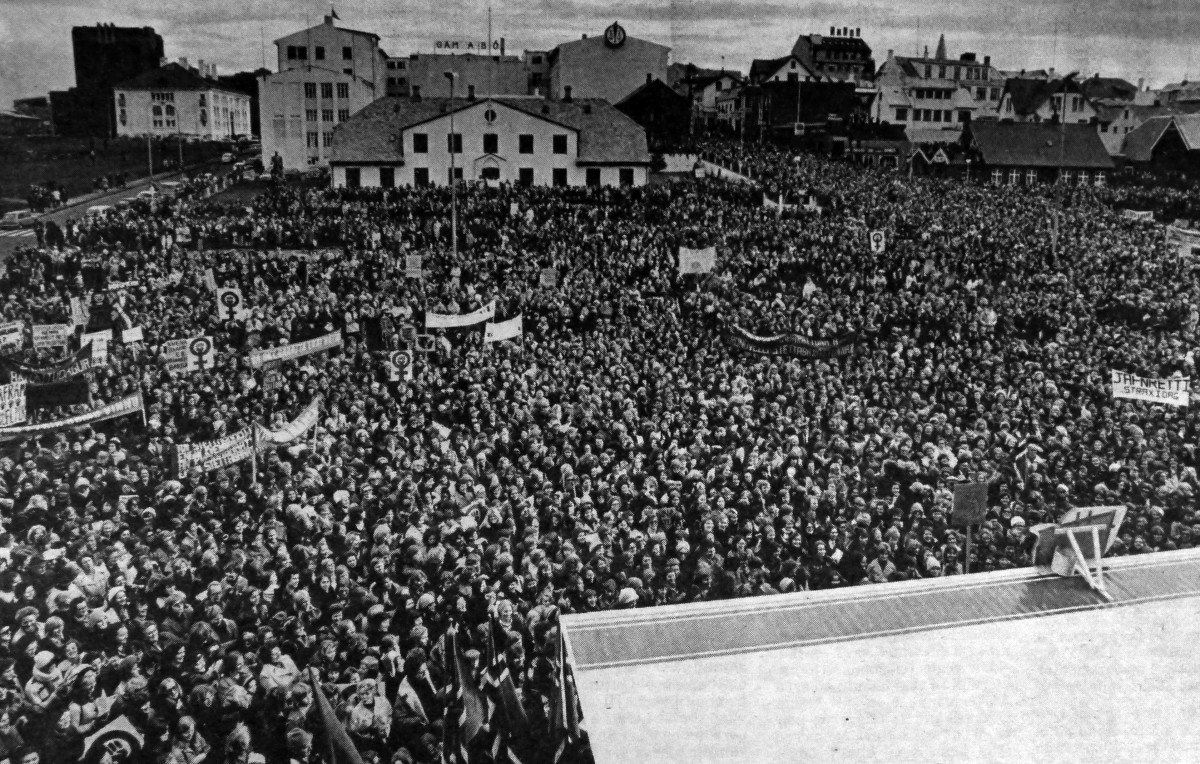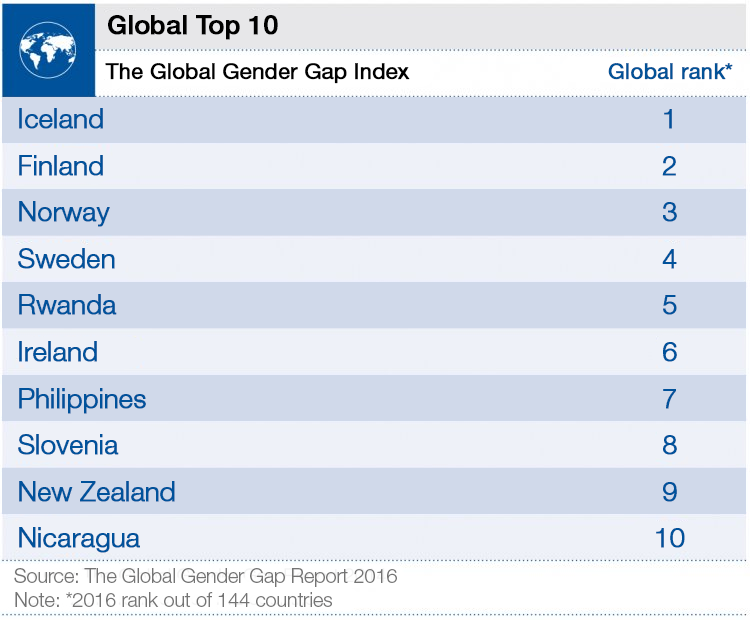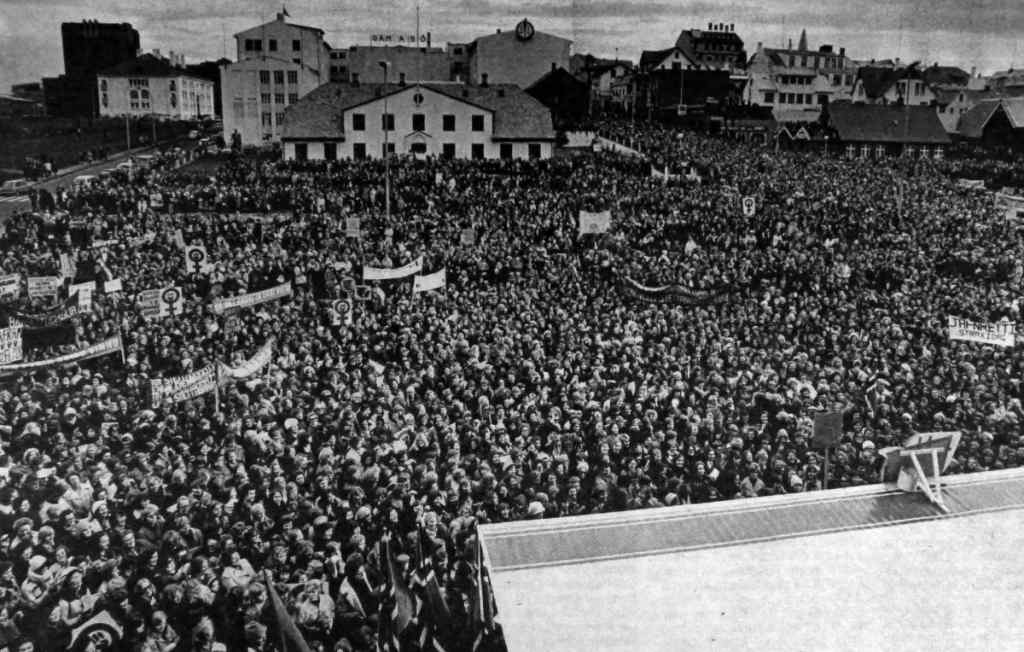
The combination of talent and technology will determine how the Fourth Industrial Revolution can drive sustainable economic growth and other benefits to society.
However, “if half the world’s talent – women – are denied full economic, political and social participation, these great opportunities will be missed.”
With this important warn The World Economic Forum starts its Global Annual Gender Gap Report. A Paper where the worldwide institution analyses the role that the women have in terms of access to health, education or labour market and also provides ways on how to tackle this situation in the near future.
First of all, the report highlights that in the past years the gap between men and women on the economic area have been reduced only a 59 per cent, faraway from the UN’s aims.
On the other hand, not everything is as bad as the result in closing the economic gap; while much work still needs to be done on the economic and political fronts, the countries surveyed by the Global Gender Gap Report in 2016 had closed 96% of the gender gap in health and over 95% of the gap in education, the highest value measured to date.
Following this trend, there is a country that excels over the other ones surveyed: Iceland.
The Nordic Country has ranked first of the top for the ninth year in a row, followed by their neighbours Norway and Finland. In fourth place, Rwanda make their stand, taking over Sweden, who completes the top 5.

Equallity, a source to be proud of
Iceland been ranking top of the rank has become a national matter. For icelancders, it is a source of pride to be the frontrunner in the World Economic Forum’s Global Gender Gap Index.
The key of their success can be summarised in a “collective action and solidarity of women human rights defenders, political will, and tools such as legislation, gender budgeting and quotas,” according to an article written by Magnea Marinósdóttir and Rósa Erlingsdóttir, both from the Iceland’s Ministry of Welfare equity unit.
For them, this achievement is due to 3 main principles:
An incremental progress that can firstly be attributed to the solidarity of women human rights defenders challenging and protesting the monopoly of power in the hands of men and the power of men over women.
Secondly, the success can be attributed to women taking power and creating alternatives to the male dominant “truths” and making the invisible realities of women visible, most importantly discriminatory practices including sexual harassment and abuse.
Lastly, Iceland’s progress can be attributed to women and men sharing power with each other as decision-makers and gradually having more men supporting the give and take of gender equality.
A Millennia of Women At The Centre of Society
Iceland’s success in parity and equity comes from a culture where women were respected and in most cases, the centre itself of the society, what Iceland’s experts describe as a notion of “strong women”.
“Despite being mythical, it has its roots in reality, as women enjoyed certain liberties and had cultural and religious authority during the commonwealth period that lingered on throughout the ages. On the religious front, diversity was embraced in the “pre-modern”, pagan society. There were gods and goddesses, as well as women and men serving as cultural and religious authorities. Women were priestesses and oracles, poets and rune masters, merchants and medicine doctors, enjoying respect in society.”

The fact that women have been active members of society has paid out in a more equally community, even with major access to political seats and decision-making position.
So far, in 2016, women accounted for 48% of elected representatives in parliament. It is also a great achievement in this long struggle that the number of women in the cabinet has, in recent years, begun to reflect the share of women in parliament.
The executive power also has been referred to as the highest glass ceiling. After more than 100 years since women got national suffrage, there is almost political equality.
Therefore, it can be said that the status of women in Iceland was, historically, relatively equal to men even though legal equality was not ensured until 1976.
There is Still Work To Be Done…
But not everything are good news and both Magnea Marinósdóttir and Rósa Erlingsdóttir agree that there is still work to do, and new challenges that have to be overcome.
“Equal sex ratio is still not enough if the aim is to reach gender equality in political representation. To reach that aim, women have to be placed high(er) on the list of candidates to have an equal chance to be elected into power. One of the success stories in Iceland is that among the long-established political parties, only one party does not apply some kind of gender quota rules, such as a “zipper system” when selecting men and women on its lists of candidates,” said the experts.
For that, still, every woman is rendered vulnerable if she does not have or is stripped of real power by a system that does not de jure or de facto protect women’s rights vis-a-vis men in case of conflict. This applies in particular to situations of violence against women and girls perpetrated by family members or strangers within or outside their homes.

Hernaldo Turrillo is a writer and author specialised in innovation, AI, DLT, SMEs, trading, investing and new trends in technology and business. He has been working for ztudium group since 2017. He is the editor of openbusinesscouncil.org, tradersdna.com, hedgethink.com, and writes regularly for intelligenthq.com, socialmediacouncil.eu. Hernaldo was born in Spain and finally settled in London, United Kingdom, after a few years of personal growth. Hernaldo finished his Journalism bachelor degree in the University of Seville, Spain, and began working as reporter in the newspaper, Europa Sur, writing about Politics and Society. He also worked as community manager and marketing advisor in Los Barrios, Spain. Innovation, technology, politics and economy are his main interests, with special focus on new trends and ethical projects. He enjoys finding himself getting lost in words, explaining what he understands from the world and helping others. Besides a journalist, he is also a thinker and proactive in digital transformation strategies. Knowledge and ideas have no limits.












